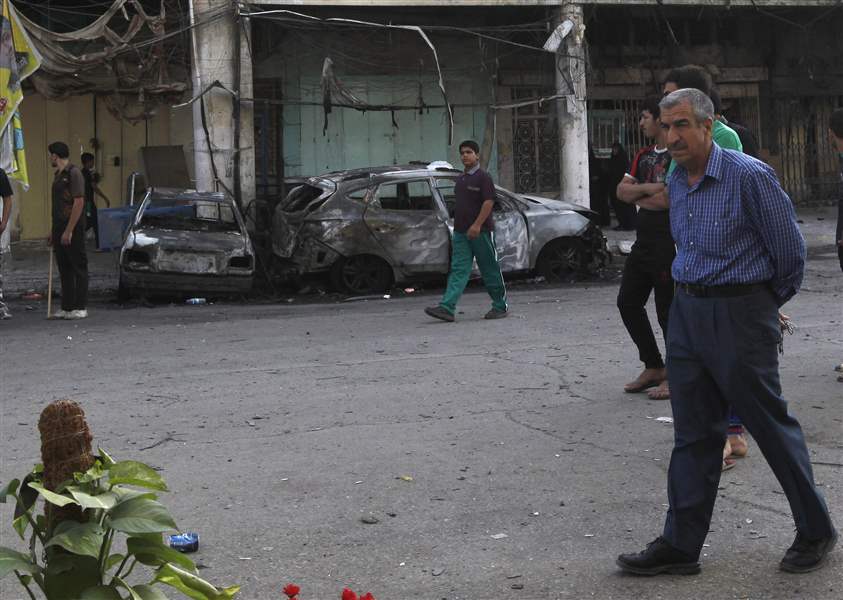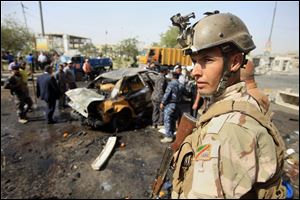
Bombings, clashes kill 15 in Iraq wave of violence
5/28/2013
Local Iraqis walk around the site of a car bomb attack at al-Keefah street in Baghdad, Iraq, Tuesday, May 28, 2013. A coordinated wave of car bombings tore through mostly Shiite areas of Baghdad on Monday, killing and wounding dozens of people, as insurgents step up the bloodshed roiling Iraq. (AP Photo/ Hadi Mizban)
ASSOCIATED PRESS

An Iraqi soldier stands guard at the scene of a bomb attack at Sadr City in Baghdad, Iraq, today.
BAGHDAD — Bombings and gunfire in central and northern Iraq killed at least 15 people and wounded 35 others today, officials said, in the latest bloody chapter of a wave of violence that has edged the country closer to all-out internal warfare.
A day earlier, 70 people were killed, and more than 450 have died this month. Most of the attacks are sectarian in nature, with Sunni and Shiite areas targeted frequently.
The sudden spike in bloodshed is reminiscent of the upheavals of the last decade, when U.S. forces were still in Iraq in large numbers. The sectarian carnage has resumed with new ferocity since the last U.S. troops withdrew last December.
Today's violence spread across the country.
A bomb explosion inside a bus killed five commuters in Sadr City, a poor Shiite district in the Baghdad’s east, a police officer said. Five policemen and 20 civilians were wounded.
In the town of Tarmiyah north of Baghdad, a suicide bomber set off his explosives-laden truck after passing a police checkpoint, killing a policeman and a civilian, police said. Nine people were wounded.
In the northern city of Mosul, clashes erupted out between police and gunmen, killing three policemen, two officers said. Four gunmen were killed and 15 others arrested. South of Mosul, a bomb hit a police patrol, killing an officer and wounding another, police said.
Mosul, about 220 miles northwest of Baghdad, is a former stronghold of Sunni militants.
Three medical officials confirmed the casualties. All spoke on condition of anonymity as they were not authorized to release information to reporters.
No one has claimed responsibility for the recent wave of attacks, but such systematic bombings bear the hallmarks of Sunni insurgents under the leadership of the al-Qaida branch in Iraq, known as the Islamic State of Iraq. They appear aimed at drawing the country’s majority Shiites into an exchange of attacks like that which brought the country to the brink of civil war in 2006-2007.
On Monday, more than a dozen car bombs hit commercial areas in mostly Shiite areas of the Iraqi capital, killing 71 people and wounding nearly 200.
Iraqi Prime Minister Nouri al-Maliki charged that the motive behind the current flare-up was to return Iraq to the “dark days” of the past decade. He vowed to hunt down all militant groups, regardless of their religious and political affiliations.
“The recent attacks that killed dozens of innocents expose the criminal intentions and the goals of the terrorist organizations to send Iraq back to sectarian fighting,” al-Maliki told reporters in Baghdad.
Today, U.N. envoy Martin Kobler pressed Iraqi leaders to do more to halt the violence, saying it is “their responsibility to stop the bloodshed now.”
Kobler has repeatedly urged Iraqi officials to engage in dialogue as violence and political tensions have increased in recent weeks.
He warned political leaders today that “the country will slide into a dangerous unknown if they do not take immediate action.”